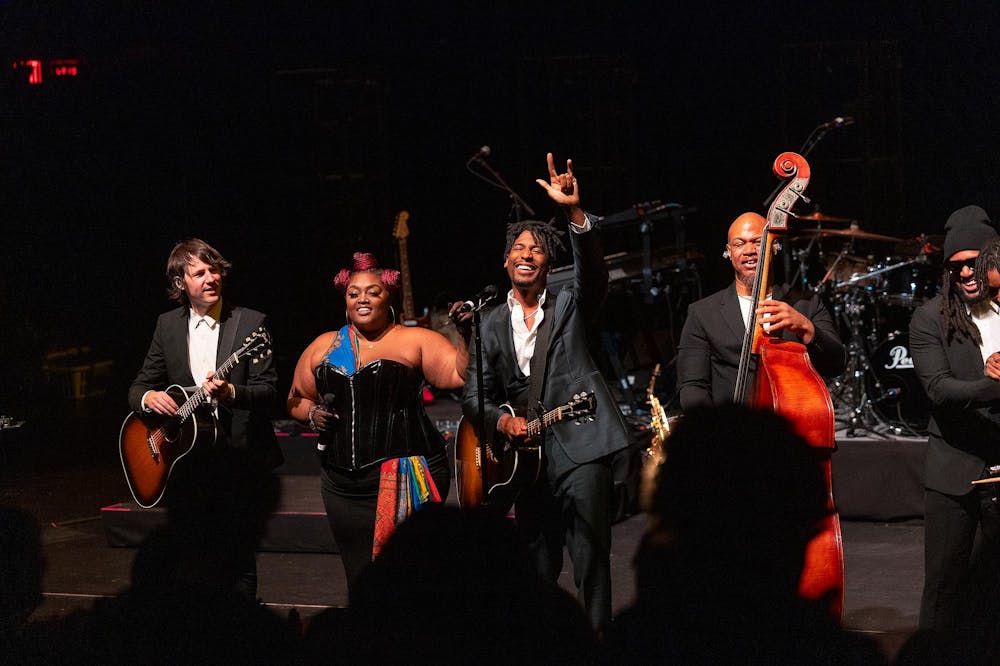A lucky few hundred community members who secured tickets to “Jon Batiste in Concert” at the Lindemann Performing Arts Center on Saturday night were treated to an ethereal 90-minute performance. Within the first few minutes, it was evident that the five time Grammy-award-winning artist deserved every single accolade he has received.
Batiste’s performance was part of “Brown 2026” — an initiative created to celebrate 250 years of American democracy and education’s role in it.
Bathed in orange light, Batiste told the audience, “I love you even if I don’t know you” as he entered the stage. Batiste — along with his band — echoed this sentiment throughout the entire show, repeatedly signing “I love you” in American Sign Language.
Congregated at the front of the stage, Batiste and his band started their performance with a mashup of his song “Master Power” and the track “AMERIICAN REQUIEM” off of Beyoncé’s latest album, “Cowboy Carter.” Later in the show, Batiste’s passion for his artistry was on display when he and his drummer improvised a set on the drums. His joy was palpable.

Interspersed throughout the concert were solos by different band members, highlighting the collaborative nature of music making. Batiste himself ensured that these members received recognition by introducing them individually and encouraging them to play a tune of their choice.
The vocals of the band’s lead backup singer, Desiree “Desz” Washington, were particularly captivating. At one moment during the performance, Washington effortlessly belted ad-libs as she twisted her hair into a bun. Washington’s skill and stage presence were essential to the soul of the show.
The performance felt intimate, with a component of interaction between the artist and audience that is often lost in modern-day concerts. During one part of their performance, Batiste and his band stepped off the stage and into the audience, allowing those seated farther back to have a front-row view. During this escapade, Batiste played the melodica — a curious piano-flute contraption.
Batiste frequently encouraged concertgoers to get on their feet, clap, dance and sing throughout the show, drawing from his childhood upbringings in the New Orleans church. By the end of the show, attendees were so enmeshed in the music that some started to dance in the aisles, including Brown’s very own President Christina Paxson P’19 P’MD’20. It felt like Batiste was performing not to the audience, but with them.
In an ode to Brown 2026, Batiste delivered arguably the best rendition of the “Star Spangled Banner” that has ever graced this campus. The number began with “Moonlight Sonata Blues” — Batiste’s blues-inspired iteration of Beethoven’s famous piece — which slowly morphed into a piano interpretation of the country’s national anthem. Batiste sang the final few verses of the anthem ritardando — gradually decreasing in speed — before transitioning into covers of The Beatles’ “Blackbird” and Louis Armstrong’s “What a Wonderful World” that brought some in the audience to tears.

The superb use of lighting in Lindemann enhanced Batiste’s performance. Audiences were transported into the world of Jon Batiste through swirling lights and kaleidoscopes of color. A spotlight distinguished Batiste from a sea of others dancing and singing alongside him during his audience interlude.
Batiste continued his weekend at Brown with a musical masterclass for students and a conversation with his wife, Suleika Jaouad, followed by a screening of their documentary “American Symphony.”

Talia LeVine is a section editor covering arts and culture. They study Political Science and Visual Art with a focus on photography. In their free time, they can be found drinking copious amounts of coffee.
Manav is a junior from Indiana, concentrating in International and Public Affairs. In his free time, he likes attempting the daily Connections puzzle or falling down Wikipedia rabbit holes.





